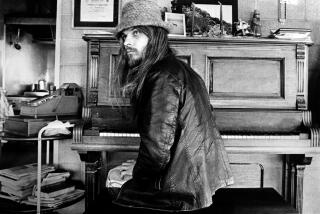Williamson at ‘His Best’ Playing Blues
- Share via
Though the late Sonny Boy Williamson never had as much of an R&B; chart presence as his Chess and Checker Records label mates Chuck Berry, Bo Diddley and Muddy Waters, he was an exceptionally gifted singer, songwriter and harmonica player who had a major influence on numerous rock musicians in the ‘60s and ‘70s.
His anxious “One Way Out” was picked up--arrangement and all--by the Allman Brothers Band, while his “Born Blind” (or “Eyesight for the Blind”) was adapted by the Who in its rock opera “Tommy.” The Rolling Stones and the Animals are among the other bands that have acknowledged a debt to him.
In “His Best,” featuring music recorded between 1955 and 1964, Williamson sings with the confidence and bite of a Joe Turner, and his songs exhibit the wit and storytelling ease of his better-known Chess/Checker rivals.
As it turns out, Williamson’s personal life was as interesting as his music.
Dick Shurman begins his liner notes with a quote from blues guitarist Buddy Guy: “Sonny Boy Williamson used to tell me, ‘They don’t make men like me anymore.’ ”
Shurman adds, “Buddy Guy was referring to Sonny Boy’s bragging about holding his liquor, but the boast is just as true in general. . . . His youth was so rough he didn’t want to discuss it with interviewers, and life as the prototypical rambling Southern blues man during legalized segregation and widespread poverty obviously left its scars.”
Williamson was probably born near Clarksdale, Miss., sometime between 1894 and 1909. Whilehis real name is believed to be Aleck or Alex Ford, the musician adopted the name Rice Miller at some point.
But the most fascinating aspect of the Williamson story is that Ford/Miller had the audacity to appropriate the name Sonny Boy Williamson from a well-known Chicago bluesman of the time. According to Shurman, the sponsor of a radio show that featured Ford/Miller suggested that the musician take the name as a way to better promote the radio show. Since Ford/Miller was based in the South, he must have figured no one would ever know the difference.
But the real Williamson--John Lee Williamson--eventually heard of the deception and went down South in 1942 to try to straighten things out. Things didn’t work out the way he planned. Shurman quotes fellow bluesman Robert Lockwood as saying Williamson II “chased” the original Williamson out of town. “He [Williamson II] could play Sonny Boy’s stuff better than he could play it.”
For all his writing and singing abilities, Williamson, who died in 1965, seems to have impressed his fellow musicians the most with his harmonica work.
Notes B.B. King, who recorded with Williamson: “They didn’t call him the king of the harmonica for nothing. . . . He was a big dude who blew the blues out of that sucker until there was nothing left to blow. He played sitting down, using his feet like a drum--stomping loud and hard--shouting and inhaling like his life was on the line.”
Though Williamson recorded for other labels before he got to Chess/Checker in the mid-’50s, the tracks on “His Best” serve as his main body of work. It’s solid, eye-opening stuff that shows that Williamson belongs on the top level of the great Chess/Checker legacy.
*
Albums are rated on a scale of one star (poor), two stars (fair), three stars (good) and four stars (excellent).
More to Read
The biggest entertainment stories
Get our big stories about Hollywood, film, television, music, arts, culture and more right in your inbox as soon as they publish.
You may occasionally receive promotional content from the Los Angeles Times.










